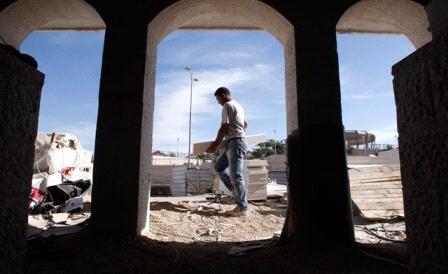Ammon News - By AFP
UNITED NATIONS
As France summoned its ambassador to Israel, the British Foreign Office said on Monday it was considering a “strong reaction” to Israel’s plans to build new settler homes, amid speculation it could recall its ambassador to Israel.
A diplomatic source said media reports about its ambassador were speculation and no decision has been taken, but it is thought to be an option.
“The Foreign Secretary (William Hague) has consistently made it very clear that settlement building, such as the recent Israeli government decision to build 3,000 new housing units, threatens the two-state solution and makes progress through negotiations harder to achieve,” AFP reported a Foreign Office spokesman as saying.
“We have called on the Israeli government to reconsider. We have told the Israeli government that if they go ahead with their decision, then there will be a strong reaction.”
Reports of a decision by Israel to build the homes in east Jerusalem and the West Bank emerged Friday, with an official source confirming it was in retaliation for the Palestinians winning the rank of a U.N. non-member state a day earlier.
France on Monday summoned the Israeli ambassador here to complain about the Jewish state’s plans to build new settler homes, the embassy said.
However, earlier Monday, the French government played down reports that France could recall its ambassador to Israel in response to Prime Minister Benjamin Netanyahu’s decision to expand settlement building.
“There are other ways in which we can express our disapproval,” a foreign ministry official told Reuters.
‘Fatal blow to peace’
U.N. leader Ban Ki-moon warned Sunday that if Israel implemented its latest plan for new settlements it would deal an “almost fatal blow” to any prospects for peace with the Palestinians.
Israel’s announcement about the 3,000 Jewish settler homes, whose planned location was not revealed, came in the wake of a historic vote by the United Nations General Assembly to upgrade Palestine’s diplomatic status.
Israeli media reported that some of the new construction would be in E1, a highly contentious area of the West Bank that runs between the easternmost edge of annexed east Jerusalem and the Maaleh Adumim settlement.
Palestinians bitterly oppose the E1 project, as it would effectively cut the occupied West Bank in two, north to south, and make the creation of a viable Palestinian state even more problematic.
“It was with grave concern and disappointment that the secretary general learned of Israel’s announcement of 3,000 new settlement units in east Jerusalem and other parts of the West Bank,” a statement from Ban’s spokesman said.
“This would include reported planning in the so-called E1 envelope, which risks completely cutting off east Jerusalem from the rest of the West Bank.
“Settlements are illegal under international law and, should the E1 settlement be constructed, it would represent an almost fatal blow to remaining chances of securing a two-state solution.”
Ban’s statement represented an unusually strong condemnation of Israeli settlement plans from the U.N. chief and followed a chorus of disapproval from the United States, Britain, France and the European Union.
“The secretary general repeats his call on all concerned to resume negotiations and intensify efforts towards a comprehensive, just and lasting peace and urges the parties to refrain from provocative actions,” Ban’s statement said.
On Thursday, the U.N. General Assembly overwhelmingly backed a resolution recognizing Palestine within the 1967 borders as a non-member observer state.
Israeli Prime Minister Benjamin Netanyahu had warned that by going to the U.N., the Palestinians had “violated” previous agreements with Israel, such as the 1993 Oslo Accords, and that his country would “act accordingly.”
In another tit-for-tat, Israeli Finance Minister Yuval Steinitz said Sunday that the Jewish state would not transfer tax and tariff funds it collects for the Palestinians this month.
Peace talks have been on hold since September 2010, with the Palestinians insisting on a settlement freeze before returning to the negotiating table and the Israelis insisting on no preconditions.
Israel has long feared that if the Palestinians won the rank of a U.N. non-member state, they could pursue the Jewish state for war crimes at the International Criminal Court particularly over settlements.
With their newly-acquired status, the Palestinians now have access to a range of U.N. agencies, as well as to the ICC, though Palestinian leader Mahmud Abbas said he had no plans to immediately petition the tribunal.
The Palestinians want east Jerusalem as capital of their state and vigorously resist expansion plans for Maaleh Adumim, which lies three miles (five kilometers) from the city’s eastern edge.
Arab East Jerusalem was captured by Israel with the rest of the West Bank in the 1967 Six-Day War and later annexed in a move not recognized by the international community.
Israel considers all of Jerusalem as its “eternal, indivisible” capital, and does not view construction in the eastern sector to be settlement activity.
